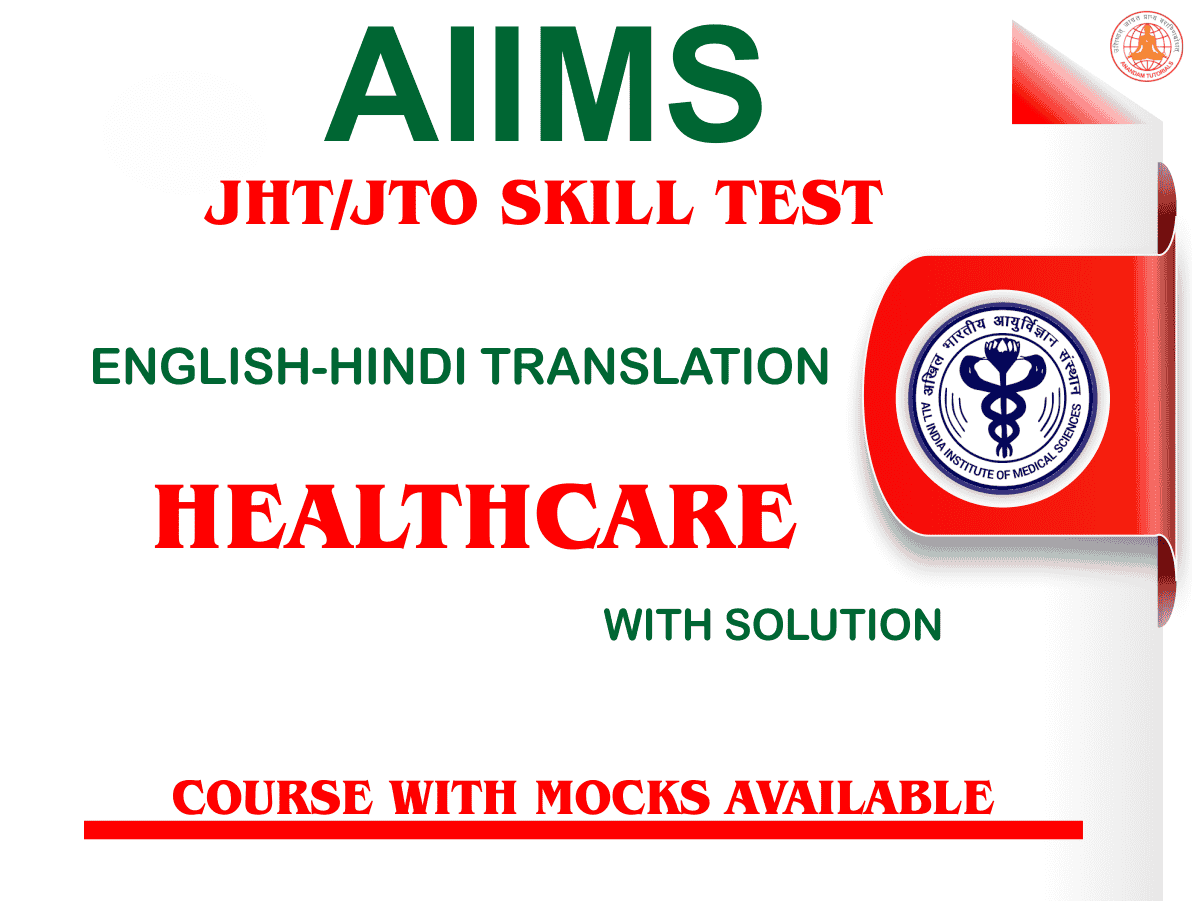All the aspirants who have qualified in Stage -I, they must sit for a Written Test Examination. This examination will be conducted in both languages i.e. Hindi and English language. Pen and Paper mode. The duration of Examination is 90 minutes.
Description of Examination and Marks for Written Test:
The Written test will be of 100 marks and distribution of marks will be as follows:
Hindi to English Translation - 15 Marks
English to Hindi Translation - 15 Marks
Letter Writing (Hindi) - 10 Marks
Letter Writing (English) - 10 Marks
Essay Writing (Hindi) 200 words - 20 Marks
Essay Writing (English) 200 Words - 20 Marks
Medical Terminology English to Hindi - 5 Marks
Medical Terminology Hindi to English - 5 Marks
Note - This examination will be qualifying in nature. The candidate will have to score a minimum of 33 marks.
Now, translate the following passage based on the subject Healthcare: -
The healthcare sector has undergone remarkable changes in recent years, driven by technology, research, and policy reforms. One of the most significant developments is the adoption of digital health technologies, including telemedicine, electronic health records, and mobile health applications, which make healthcare more accessible and efficient. Artificial Intelligence (AI) is increasingly being used for early diagnosis, medical imaging, and predictive analysis, thereby reducing human error and improving patient outcomes. Another breakthrough is the advancement in personalized medicine, where treatments are designed according to a patient’s genetic profile. This approach has shown promising results in cancer therapy and chronic disease management. The healthcare industry is also witnessing rapid growth in robot-assisted surgeries that ensure precision, minimal invasion, and faster recovery. The development of wearable health devices such as smartwatches that monitor heart rate, oxygen levels, and sleep patterns has empowered individuals to take charge of their health. In addition, significant progress has been made in vaccine research and the use of biotechnology for developing new drugs.Governments worldwide are focusing on universal health coverage, preventive care, and digital infrastructure to ensure affordable healthcare. These innovations mark a decisive shift towards a patient-centric, technology-driven healthcare system.
Solution: -
स्वास्थ्य क्षेत्र ने हाल के वर्षों में प्रौद्योगिकी, अनुसंधान और नीतिगत सुधारों के कारण उल्लेखनीय परिवर्तन देखे हैं। सबसे महत्वपूर्ण विकासों में से एक है डिजिटल स्वास्थ्य प्रौद्योगिकियों का अपनाया जाना, जिसमें टेलीमेडिसिन, इलेक्ट्रॉनिक स्वास्थ्य आलेख और मोबाइल स्वास्थ्य अनुप्रयोग शामिल हैं, जो स्वास्थ्य सेवाओं को अधिक सुलभ और प्रभावी बना रहे हैं। कृत्रिम बुद्धिमत्ता (ए.आई.) का उपयोग अब प्रारम्भिक निदान, चिकित्सीय इमेजिंग और पूर्वानुमानात्मक विश्लेषण में बढ़ रहा है, जिससे मानवीय त्रुटि कम हो रही है और रोगियों के परिणाम बेहतर हो रहे हैं। एक और महत्वपूर्ण प्रगति व्यक्तिकृत चिकित्सा में हुई है, जहाँ उपचार किसी रोगी की आनुवंशिक प्रोफ़ाइल के अनुसार तैयार किए जाते हैं। यह दृष्टिकोण कैंसर चिकित्सा और दीर्घकालिक रोग प्रबंधन में आशाजनक परिणाम दिखा रहा है। स्वास्थ्य उद्योग में रोबोट-सहायता प्राप्त शल्य-चिकित्सा का भी तेजी से विस्तार हो रहा है, जो शुद्धता, न्यूनतम हस्तक्षेप और शीघ्र स्वस्थ होने को सुनिश्चित करता है। धारणीय स्वास्थ्य उपकरणों जैसे स्मार्टवॉच, जो हृदय गति, ऑक्सीजन स्तर और नींद के पैटर्न की निगरानी करते हैं, ने लोगों को अपने स्वास्थ्य की देखभाल में सक्षम बनाया है। इसके अतिरिक्त, टीका अनुसंधान और जैव प्रौद्योगिकी के माध्यम से नई दवाओं के विकास में भी महत्वपूर्ण प्रगति हुई है। विश्वभर की सरकारें सार्वभौमिक स्वास्थ्य कवरेज, निवारक देखभाल और डिजिटल अवसंरचना पर ध्यान केंद्रित कर रही हैं ताकि सुलभ और किफायती स्वास्थ्य सेवाएँ सुनिश्चित की जा सकें। ये नवाचार रोगी-केंद्रित और प्रौद्योगिकी-प्रधान स्वास्थ्य प्रणाली की दिशा में एक निर्णायक बदलाव को दर्शाते हैं।
